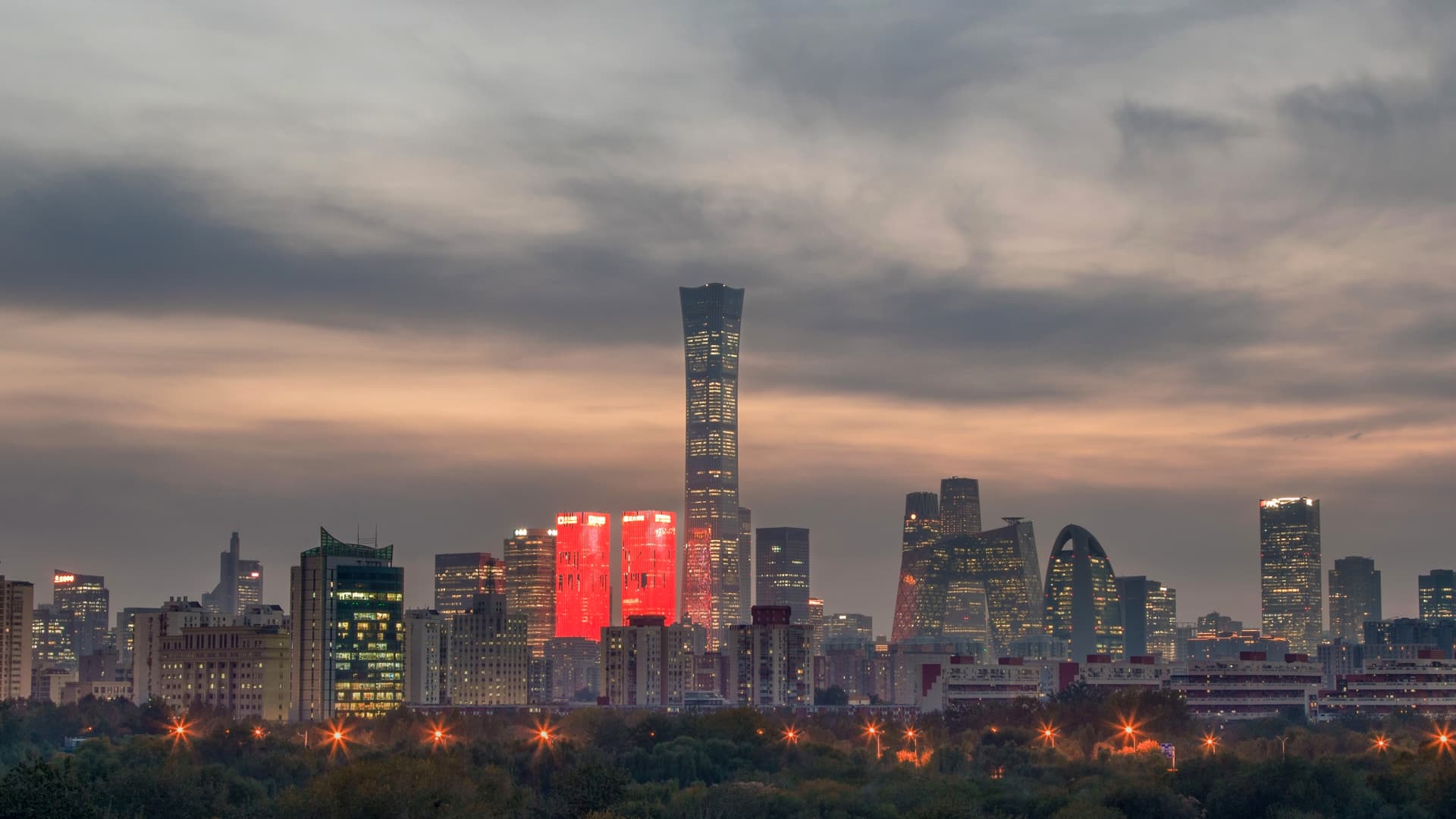
BEIJNG, CHINA – NOVEMBER 13: Illuminated skyscrapers stand at the central business district at sunset on November 13, 2023 in Beijing, China. (Photo by Gao Zehong/VCG via Getty Images)
Vcg | Visual China Group | Getty Images
Deflation may soon start biting into Chinese growth, as Beijing looks at another three to six months of a “very painful economy,” according to one analyst who covers the country.
“This is something investors need to be cautious of. The economy here is bad, it’s pretty … it’s really bad. I’ve been in China for 27 years, and this is probably the lowest confidence I’ve ever seen,” Shaun Rein, founder of the China Market Research Group, told CNBC’s “Squawk Box Europe” on Monday.
“So deflation is starting to wield its ugly head. Consumers are waiting for discounts. They’re very nervous.”
Linked to a decline in the prices of goods and services, deflation is generally associated with an economic slowdown — raising questions over the growth outlook for China, whose post-Covid-19 recovery has already fallen short of some expectations in 2023. In December, depressed prices for pork — which makes up around a fifth of China’s CPI basket — heralded the possible advent of deflation.
“Deflation is a serious issue, I know the Chinese government doesn’t want me saying it, but it’s an issue that we need to be worried about,” Rein stressed. “So I am kind of surprised that they kept the prime rates unchanged. You know, it would have been nice if they had lowered them to try to get some stimulus into the country.”
Earlier on Monday, the People’s Bank of China held its one-year and five-year loan prime rates at 3.45% and 4.2%, respectively, in line with forecasts. These are the pegs for most household and corporate loans in China and are one of many levers that the PBOC usually pulls in an effort to stimulate the economy.
The decision comes amid infectious expectations among investment banks that China’s economy will expand at a more sluggish pace in 2024. Beijing has set an official growth target of 5% this year, with Premier Li Qiang telling the World Economic Forum in Davos, Switzerland, last week that the Chinese economy swelled by a marginally higher 5.2% in 2023.
At the time, Li highlighted that China did not achieve its economic development through “massive stimulus” and “did not seek short-term growth while accumulating long-term risks.” “Rather, we focused on strengthening the internal drivers,” Li said.
Despite this, the International Monetary Fund in November outlined a forecast for China’s growth to slow in 2024 to just 4.6%. In a more recent Jan. 15 report, Moody’s assessed that China’s real GDP growth would hit 4% this year and in 2025, from an average of 6% between 2014 and 2023.

Economic slowdown is widely seen as a potential threat to Xi Jinping, whose Chinese Community Party has cultivated national political legitimacy through rapid growth. China’s status as the world’s second-largest economy has also solidified its international footing, making it and heavyweight energy exporter Russia the epicenter of the BRICS emerging markets group.
Yet Rein says that Beijing may stomach a “slight rough time” as long as the economy retains 5% growth, as the administration focuses on social transformation.
“The Communist Party of China doesn’t necessarily want a restructuring of the economy, they want a reform of society, so it’s a much bigger picture … Which is why I don’t think the government is going to want a major stimulus, so the new normal is going to be 4-5% growth over the next 3-5 years,” he said.
“I think you’re gonna deal with another 3-6 months minimum of a very painful economy, as China restructures, or as China, you know, transforms its economy towards a more slower-growth, fairer society.”
Among the more tremulous sectors of the Chinese economy, Rein identified the country’s once-bloated real estate market, which accounts for roughly a third of China’s economic activity and has been tumbling sharply since Beijing’s broad-stroke crackdown on the debt levels of mainland property developers. Real estate giants Evergrande and Country Garden have become key casualties of the clampdown.
“[Buyers] think housing prices might continue to drop, so even if there’s pent-up demand for housing, a lot of home buyers are telling us, we’re not going to buy this month, we’re not going to buy this quarter, because we’re scared prices are going to drop another couple [of] percent in the coming months,” Rein said Monday.
Such a consumer behavior could compound some expectations that China could take more than 10 years to liquidate the current overhang in its housing inventory.
